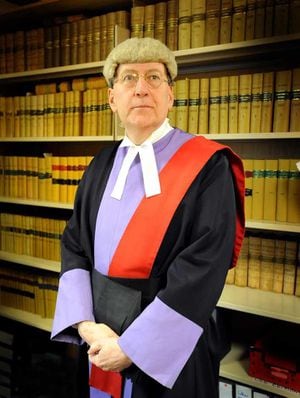Judge at sharp end of fight for justice
In a rare interview, one of the Black Country's top judges John Warner talks crime and punishment with Mike Woods.

In a rare interview, one of the Black Country's top judges John Warner talks crime and punishment with Mike Woods.
Murder, guns and gangs - it's all in a day's work for the Black Country's most senior judge John Warner.
The 63-year-old father-of-two bases his "judicial philosophy" on a quote he once read in the obituary of a fellow judge. "The job I do is extremely important," he says. "I'm not important.
"I hope to go home each evening hoping that I've done the right thing."
As the resident judge at Wolverhampton Crown Court, a sort of "team leader" for his judicial colleagues in the city, he deals with many of society's most heinous crimes.
Much of his workload involves murderers, rapists, child abusers and robbers. Between April and December last year, the court handled 2,200 cases, of which 10 per cent involved murder, other deaths or serious sexual offences. "I find it a satisfying job, a challenging job," he says. "It's never less than challenging."
The grandfather-of-two has been married for 30 years and began his legal career as a solicitor at a private practice in Birmingham, specialising in criminal law, between 1969 and 1996.
In the mid-1960s, in the last days of capital punishment, Judge Warner, then a trainee solicitor, witnessed a killer being sentenced to death.
"It was known that the Home Secretary would automatically commute it but the judge had the black cap on," he recalls.
"It was a man who had committed a murder in this country and also a murder in Germany."
Judge Warner was a part-time judge, known as a recorder, between 1989 and 1996, sitting in courts such as Stafford and Stoke.
In 1996, he was promoted to a full-time judge and in November 2007, he was made Wolverhampton's resident judge, replacing Judge Frank Chapman who left to become the Recorder of Birmingham and has since resigned.
Judge Warner rejects accusations sometimes levelled at the courts that the criminal justice system is more concerned with the rights of the criminal than the victim.
"There's a constant tension between the nature and seriousness of the offence that you're dealing with and the personal circumstances of the offender," he explains.
"But at the end of the day, the protection of the public has to be the over-riding concern.
"It's not a pleasing thing to lock anybody up, particularly if you're having to do it to someone who may not have been locked up before. You have to switch off. You should never stop worrying about the job you're doing, but if you were to keep turning the case over when you got home and turning it over the next day, you wouldn't be able to do the next case properly."
Judge Warner said no matter how many times he presided over cases, it is always a tense moment when a jury returns.
"The longer I have done this job, both as a solic itor in the past and as a judge now, the more confident I am that the jury system, while it's certainly not perfect, is the least bad way of determining these matters," he adds.
"I have a lot of confidence in the jury system." He said the courts were seeing "more and more" youngsters in the system committing more serious offences.
"It's still the case that drink and drugs play a major part in a lot of offending and it's still the case when you look at the reports of people you are having to send to prison, many have been in the care system or have come from dysfunctional families."
In July last year, he jailed 25-year-old Errol Price, of All Saints Road, All Saints, for at least 14 years for stabbing a man through the heart as he lay defenceless on the ground in Bilston.
He told Priceat the time: "This is yet another tragic example of the enormous risk cre- ated and the fatal consequences caused by those who carry knives. The clock cannot be turned back. Things are changed forever."
And in September last year he jailed 18-year-old knife attacker Shane Henry, of Cartwright Street, All Saints, for five years for slashing the face of a 17-year-old Black Country youth councillor in Wolverhampton. Judge Warner said "anecdotally" he had the impression that robberies involving knives were on the rise.
"The problem is that knives are very easily carried," he says. "Some people who are in fear of violence are carrying knives or using that as an excuse. It's not a proper excuse. It's too easy if you've got a knife to produce one. If you produce it it's too easy to use it. If you use it there's always a high risk that someone's going to be seriously injured or killed. It is a concern."
The judge said certain crimes sometimes were committed in trends, such as metal theft. "It remains to be seen whether we're going to see an increase in crimes of dishonesty as a result of financial pressure that people feel," he says.
"The law is incredibly complicated now. Sentencing used to be really straightforward. It now requires a really detailed knowledge of the law."
But he says he has never found himself in a position where he was unable to hand out a sentence he wanted to because of the limits of the law.
"You have to look at the case in front of you and decide what the right sentence is," he says. "You have to do what you think is right in the case." He reserves judgement, however, on his own success or otherwise as a judge and adds: "It would be for others who have to say whether I was right or wrong."





